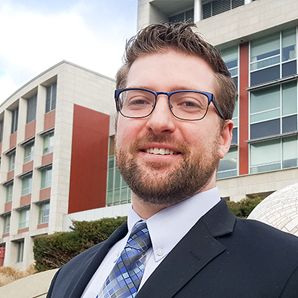Why did you choose graduate school at IUPUI?
The Department of Health Policy and Management (HPM) prepares students to cultivate skills regarding health policy development and healthcare organizational management. As a part of the curriculum, students study the historical, political and economic contexts of policy development. Also, the IU Richard M. Fairbanks School of Public Health is strategically located in the heart of Indianapolis, only a couple of blocks from the State’s Capitol. This allows students to not only study the theoretical components of health policy development, but also allows students to gain practical experience with the policy process. In fact, through my coursework in the PhD program I was able to get involved with the Indiana Prescription Drug Abuse and Prevention Task Force, provide expert testimony to both the State House of Representatives and State Senate. This experience resulted in students sharing our experience at a national conference and publishing our work in the Journal of Addictions Nursing.
What has been your favorite academic accomplishment since you’ve been here?
In 2013, Indiana was among seven states, identified as having a commitment to advancing health workforce initiatives that participated in a policy academy with the National Governors Association Center for Best Practices (NGA Center). While at IUPUI and through work with the Bowen Center for Health Workforce Research and Policy at the IU School of Medicine, I was able to work with the NGA Center and Governor’s office on the policy academy which was titled, “Building a Transformed Healthcare Workforce: Moving from Planning to Implementation”. Just recently this work culminated in the creation of a Governor’s Health Workforce Council that will help develop data-driven health workforce policies for the State of Indiana. My experience on this project and through my coursework in the Department of Health Policy and Management has opened doors for me to continue collaboration with the NGA Center on future technical assistance programs.
What do you enjoy most about life in Indianapolis?
Indianapolis is truly the “Crossroads of America”, which actually provides significant travel opportunities for graduate students. The Indianapolis International Airport is quick and easy to get in and out of which lends graduate students the opportunity to find cheap flights to regional and national conferences. Partly due to the ease of travel out of Indianapolis, I have been able to attend several national conferences including the American Public Health Association’s Annual Meetings, AcademyHealth’s Annual Research Meeting, and the Association of American Medical Colleges Health Workforce Research Conference.
Please provide some details about your work/research as a graduate student and/or any activities you are involved in.
The U.S. health system is undergoing massive transformations. It is moving from a “sick care” system focused on diagnosis and treatment to a system that “cares for health” and is focused on disease prevention and health promotion. This shift has significant implications for the healthcare delivery system and its workforce. The U.S. health system must ensure the health workforce has the capacity to meet a growing demand for health care services; however a current shortage of primary care providers threatens access to care. Currently, the system is in need of an additional 17,722 primary care providers to meet the present demand for health services. One approach to reducing the burden of the primary care shortage is to fully leverage the expertise and training of non-physician providers, such as nurse practitioners (NPs). NPs are regulated through state level professional practice acts which delineate the clinical tasks permitted and the level of professional independence provided to these health professionals. Although NPs are trained to national level academic standards variations in these professional practice regulations have been shown to influence health care delivery.
I am currently working on my dissertation which is tentatively titled, “Nurse Practitioner Practice Characteristics and Patient Care Patterns: Understanding the Role of State Professional Practice Environment”. The dissertation examines the impact of state professional practice regulations on nurse practitioner provided care and will significantly contribute to our understanding of how state policy environments impact access to health care, health care delivery and health outcomes.


